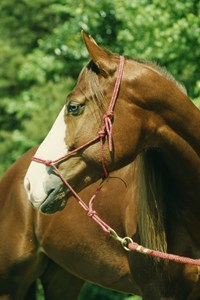Independence Day fireworks may enthrall your community, but for the horses nearby the celebration can be extremely stressful.
A recent study from New Zealand showed that nearly 80 percent of horses in the vicinity of a fireworks show exhibited signs of anxiety, despite attempts to manage the situation.

“Fireworks are sold [in New Zealand] for the three days leading up to Guy Fawkes Day in November, and the majority are probably set off in the weeks following,” says Gabriella Gronqvist, PhD, with Massey University. Each year, she adds, there are media reports of injuries or deaths in horses who were spooked by the pyrotechnics.
Public backlash to fireworks also occurs annually, Gronqvist says. “Almost yearly, petitions float around lobbying for a ban on fireworks in New Zealand, partly due to the anxiety they cause in animals. Recently, the national fire service and the Royal New Zealand Society for the Prevention of Cruelty to Animals promoted a legally binding referendum to try to have private use of fireworks made illegal. The difficulty with the fireworks debate has been a lack of data to back up the anecdotal claims.”
To collect such data, the researchers surveyed 1,111 caretakers of 6,431 horses, a number that represents about 9 percent of the non-racing horses in New Zealand. Half of the respondents identified as living on “lifestyle blocks,” which are the equivalent of small “farmettes” in suburban areas of the United States. Only six percent of respondents indicated their horses had not been exposed to fireworks in the previous year.
The reactions of the horses to fireworks were consistent: All but seven respondents indicated that their horses had at some time exhibited at least one anxiety-related behavior, such as galloping, sweating or trembling. Galloping was the most common behavior, reported by 82 percent of the respondents, and 35 percent of respondents reported that they’d had a horse break through a fence as a result of firework-provoked anxiety.
Overall, 26 percent of respondents indicated that their horses had sustained injuries associated with firework-related anxiety, the most common being cuts and strains or sprains.
Owners reported trying various management strategies to help keep horses calm during fireworks displays. The most common was moving the horse to a paddock farther away from the show, which was implemented by 77 percent. However, 37 percent of those owners reported that this was unsuccessful.
Thirty percent moved their horses off the property entirely, and 19 percent sedated horses during fireworks; in both cases, the measure was unsuccessful 9 percent of the time.
Gronqvist says another option is habituation—exposing a horse to the stimulus until he is no longer upset by it—but the nature of fireworks displays makes that an impractical solution. “I believe it is possible to habituate horses to fireworks,” she says. “Horse can be safely habituated to a variety of ‘noxious stimuli’ and development of a preventative package or management strategy for general horse owners could greatly reduce injuries. The main problem horse owners faced [in our survey] appeared to be the intermittent exposure to fireworks, which did not permit planned preventative strategies.”
As far as New Zealand legislation is concerned, Gronqvist says that “tighter regulation focusing on limiting the number of days private fireworks could be used would greatly increase the ability of horse owners to develop practical management strategies to reduce risk and injury.”
Reference: “The management of horses during fireworks in New Zealand,” Animals, March 2016
This article first appeared in EQUUS issue #466, July 2016.

